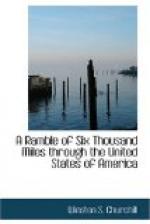Illinois is a free state, and its constitution is but a counterpart of those of Ohio and Indiana. The extent is 380 miles from north to south, and about 140 miles from east to west: area, 52,000 square miles, or 33,280,000 acres. The population in 1810, was 12,282; in 1820, 55,211: white males, 29,401; white females, 24,387; slaves, 917; militia in 1821, 2,031. The present population is, according to the last census, 157,575. The increase within the last ten years has been nearly 186 per cent.
This state is better circumstanced than any other in the west. It is bounded on the north by the north-west territory; on the south by the Ohio; on the east by the Wabash and Lake Michigan; and on the west by the Mississippi. The Illinois river is navigable at almost all seasons to very nearly its head waters; and by means of a very short portage a communication is established between it and Lake Michigan. A canal is contemplated between this lake and the Wabash.
The heath-hen (tetrao cupido), or as it is here called, the ‘Prairie-hen,’ abounds on the prairies, particularly in the neighbourhood of barrens. This species of grouse, I believe, is not to be met with in Europe; nor has it been accurately described by any ornithologist before Wilson. One habit of the male of this bird is remarkable: at the season of incubation, the cocks assemble every morning just before day-break, outside the wood, and there exercise themselves tilting until the sun appears, when they disperse. Hunters have not failed to note the circumstance, and take advantage of it.
We were frequently amused with the movements of the “Turkey buzzard” (vultur aura). This bird is well known in the southern and western states; and in the former is considered of so much utility that a penalty is inflicted on any person who may wantonly destroy it. It is perfectly harmless, never attacking even the smallest living animal, and seems always to prefer carrion when in a state of putrefaction. Except when rising from the ground, the buzzard never flaps its wings, but literally floats through the atmosphere, forming graceful ogees.
During our journeys across Illinois, we passed several large bodies of settlers on their way to Sangamon and Morgan counties in that state. These counties are situated on the Illinois river, and are said to be fertile tracts. The mass of those persons were Georgians, Virginians, and Kentuckians, whose comparative poverty rendered their residence in slave states unpleasant.
Perhaps there is nothing more remarkable in the character of the Americans than the indifference with which they leave their old habitations, friends, and relations. Each individual is taught to depend mainly on his own exertions, and therefore seldom expects or requires extraordinary assistance from any man. Attachments seldom exist here beyond that of ordinary acquaintances—these are easily found wherever one may go, arising from a variety of circumstances connected with their institutions and their necessities; and thus one of the great objections that present themselves to change with Europeans scarcely exists here. Observe, I apply this remark more particularly to the western and southern states; for the eastern states being longer settled and more thickly populated, these feelings, although they exist, yet they do so in a more modified degree.




